Man Gives Pregnant Daughter A Month To Pack Out After She Sent His Cat To A Shelter Without Informing Him
Cats develop close bonds with their human owners. There are numerous documented instances where cats show signs of distress after the owner has passed away or had to leave.
Cats have been observed to meow while perched outside the owner’s bedroom door. Some will hide, and they won’t even eat.
Some healthy cats developed such a strong bond with their owners that, when their human passed away, they equally joined them, with a broken heart appearing to be the only cause. Even cats have been known to lick tears.
So why would anyone want to send such an adorable creature back to the shelter? Or is it that they don’t know that cats living in shelters can experience a lot of stress, which makes them more susceptible to both physical and behavioral issues like weight loss, excessive grooming, self-trauma, aggression, withdrawal, urinary issues, and upper respiratory infections?
Such issues not only cause the cats pain but also decrease their chances of being adopted soon, creating a vicious cycle that can be challenging to stop. In today’s AITA story, the OP’s pregnant daughter sent his cat to the shelter because she didn't think it was safe to keep an old grouchy cat around an infant.
Well, the OP wasn’t having it and issued her a quit notice. Read the whole story as you keep scrolling below.
And here we have the title

The OP found the cat in a dumpster
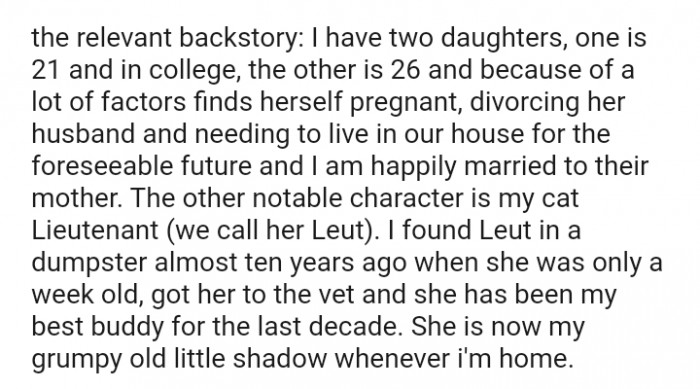
We made a decision to send the cat to the shelter
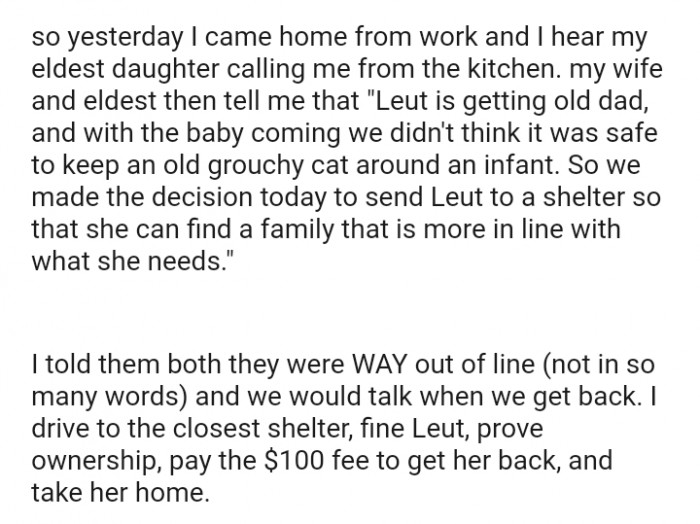
The emotional bond that exists between pets and their owners is well-documented in psychological literature. According to Dr. Daniel Goleman, an emotional intelligence expert, "Pets can provide a unique form of companionship that enhances our emotional well-being, helping to alleviate feelings of loneliness and depression." This bond is often characterized by attachment theory, which describes how individuals form emotional connections and the resultant behavioral responses when these connections are disrupted.
In this case, the father's reaction to his daughter's decision to surrender his cat illustrates the potential for emotional distress when a beloved pet is removed from the family unit. Dr. Sue Johnson, a couples therapy pioneer, notes that "the loss of a pet can evoke profound feelings of betrayal and abandonment, especially when that pet has been a source of comfort during difficult times." This emotional landscape underscores the importance of considering the psychological impacts on both humans and animals in familial decisions.
Navigating the Challenges of Expecting Parents
Expecting parents often face numerous challenges, including the need to make difficult decisions regarding family dynamics and pet ownership.
Research from the Journal of Family Psychology highlights that transitions to parenthood can create stress, leading to heightened sensitivity around perceived threats to the family unit.
This context can exacerbate conflicts regarding existing pets and their roles within the new family structure.
She kept insisting that old cat are dangerous for kids

My daughter should come before a cat

The Reddit post got a lot of attention as it was upvoted more than 24K along with 2.8K comments. We've gathered a bunch of their replies for you below.
It also doesn't quite add up

The Role of Communication in Family Dynamics
Effective communication plays a critical role in family relationships, particularly when navigating decisions that affect multiple members. Research from the University of Michigan indicates that open dialogue can significantly reduce misunderstandings and conflicts within families. The study highlights how families who engage in regular discussions about their needs and expectations are better equipped to handle disagreements amicably.
In this scenario, the daughter's unilateral decision to rehome the cat without discussing it with her father reflects a breakdown in communication, leading to a sense of betrayal. Family therapists often emphasize the need for collaborative decision-making, especially in emotionally charged situations like the arrival of a new baby. Establishing clear communication guidelines can help families navigate such transitions more smoothly, fostering an environment where all members feel heard and valued.
When the decision to rehome a pet is made without consulting all family members, it can lead to feelings of betrayal and resentment.
A study published in the Journal of Marriage and Family indicates that effective communication and collaborative decision-making are essential for maintaining harmony during significant life changes.
Addressing these feelings through open discussions can help mitigate emotional distress.
Many people believe cats are dangerous to babies
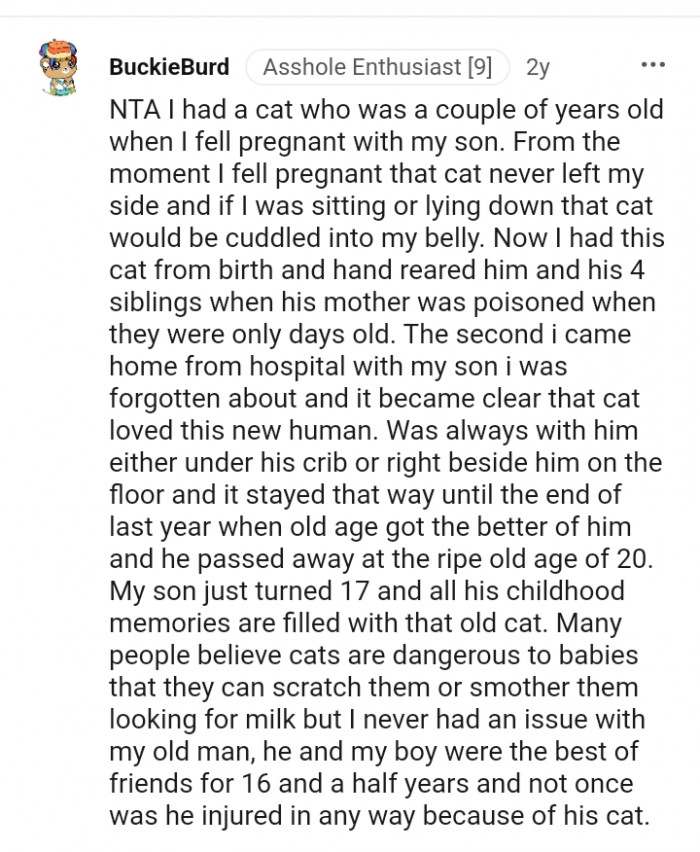
Plenty of people can maintain a cat and an infant
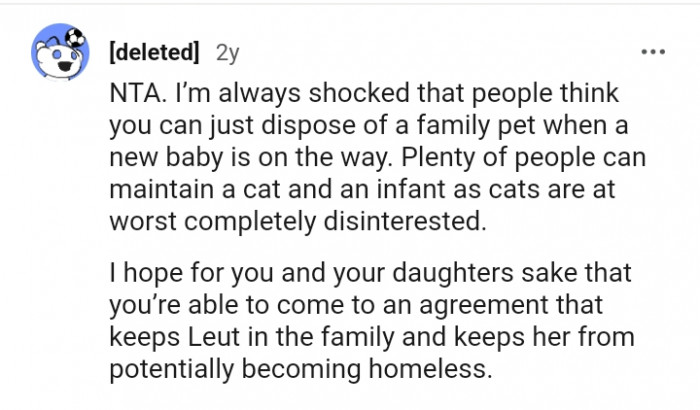
I don't trust their behavior following this
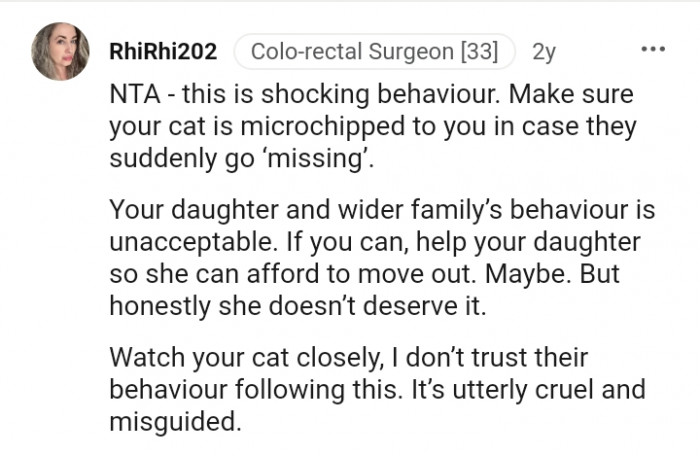
Behavioral psychologists emphasize the concept of *emotional regulation*, which involves managing one’s emotional responses to various situations. The father's extreme reaction to his daughter's actions can be viewed as a failure to effectively regulate his emotions, potentially influenced by stressors related to the impending arrival of a grandchild. Research published in the journal Emotion shows that individuals who struggle with emotional regulation often experience heightened feelings of anger and frustration, which can lead to impulsive decisions, such as asking a family member to leave.
Improving emotional regulation skills can be achieved through mindfulness practices, which have been shown to help individuals observe their emotional responses without immediate judgment or reaction. By incorporating mindfulness into family discussions, individuals can create space for reflection before reacting, ultimately leading to more constructive conversations.
Understanding the Emotional Landscape of Parenthood
Becoming a parent often triggers a reevaluation of priorities and values, particularly regarding family roles and responsibilities.
Dr. Laura Markham, a clinical psychologist, emphasizes the importance of addressing emotional needs during this transition to foster family cohesion.
Understanding each other's emotional landscapes can facilitate more supportive decision-making processes.
You should get your cat microchipped just in case
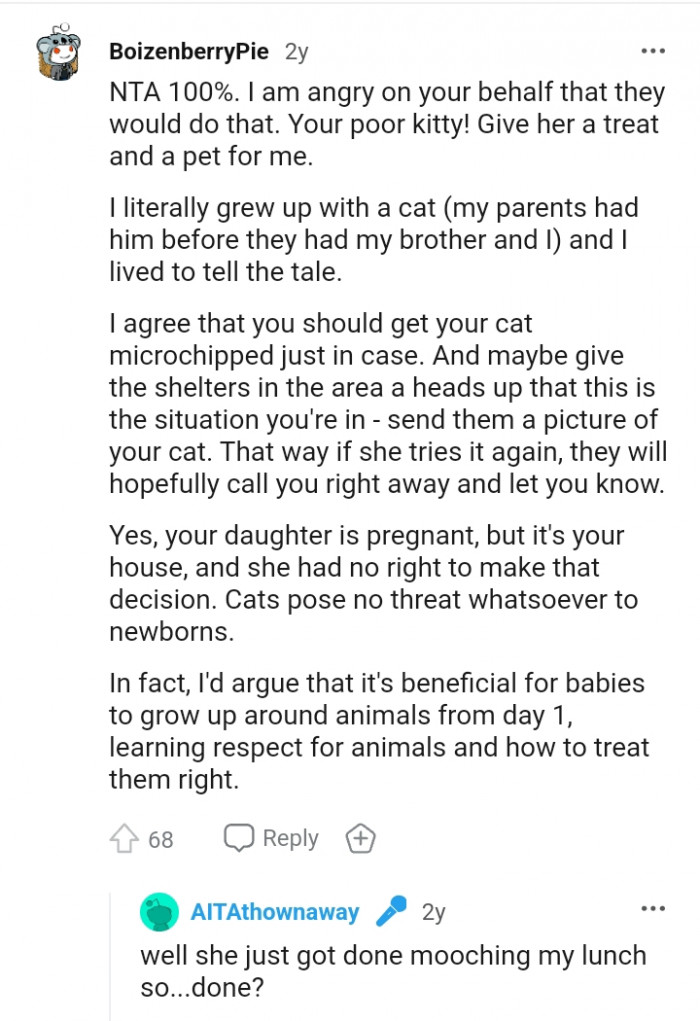
Cat has more rights than her
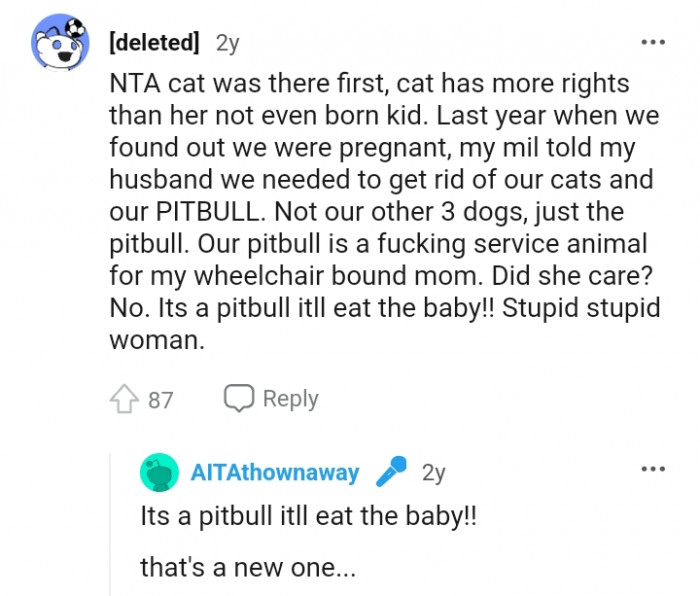
She can't remove a member of the family without asking you

Understanding Attachment Styles
The dynamics highlighted in this situation may also be influenced by attachment styles, which can shape how individuals respond to perceived threats to their relationships. Dr. Phillip Shaver, a prominent researcher in this field, outlines how secure, anxious, and avoidant attachment styles affect interpersonal interactions and emotional responses. The father’s attachment style may predispose him to react strongly when he feels that his bond with his cat—and implicitly, his authority within the family—is threatened.
Psychologists suggest that understanding one's attachment style can lead to healthier interactions. By recognizing that reactions are often rooted in deeper insecurities, individuals can work towards more constructive responses to family conflicts. Awareness of these patterns allows family members to navigate their relationships with empathy and understanding, ultimately fostering a more harmonious family environment.
Creating a shared vision for family dynamics, including the roles of existing pets, can help reduce stress and confusion.
Research suggests that families who establish clear expectations and responsibilities report higher satisfaction and lower conflict levels.
Engaging in family meetings to discuss these topics can foster a sense of teamwork and shared purpose.
It's absurd and selfish to come into your home...
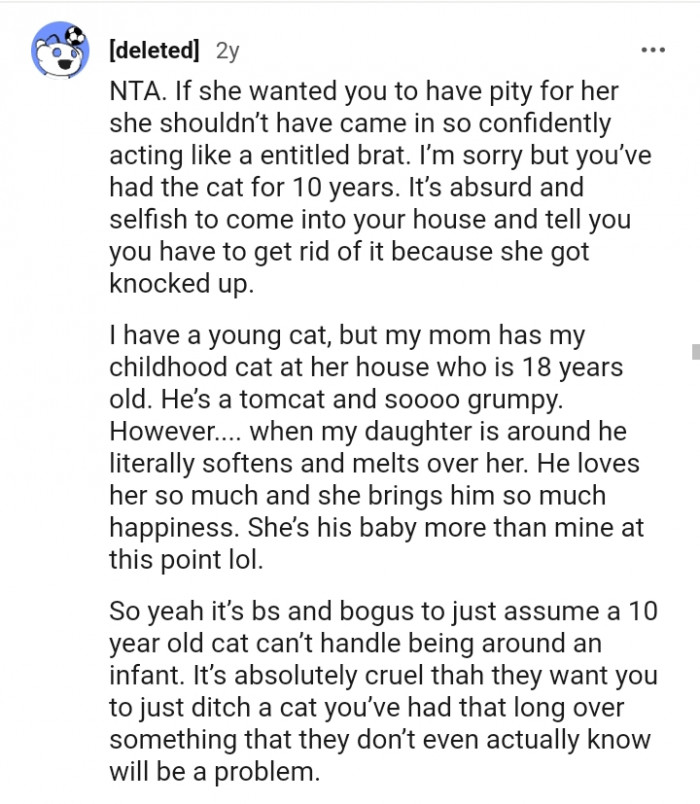
She might learn the world doesn't owe her a living

I would just as mad as the daughter

A study conducted at Johns Hopkins University explored the psychological effects of pet ownership on family dynamics and emotional well-being. Findings indicated that pets, such as cats and dogs, often serve as emotional mediators within families, providing comfort during stress and conflict. In this case, the father’s bond with his cat likely provided him with emotional support during a transitional period in his life, making the decision to give the cat away particularly painful.
To mitigate such conflicts, families can benefit from implementing structured family meetings where each member can express their concerns and preferences regarding pets and other shared responsibilities. Research shows that involving all family members in these discussions not only promotes empathy but also helps in developing collective solutions that respect everyone’s emotional attachments.
The Role of Compromise in Family Decisions
Compromise is crucial in navigating family decisions, particularly when tensions are high.
Studies show that finding mutually acceptable solutions can reduce conflict and strengthen family bonds.
For instance, discussing potential arrangements for the pet's care can help both parents feel valued and respected in their roles.
She is lucky you gave her a month

Your daughter has been listening to old wives tales
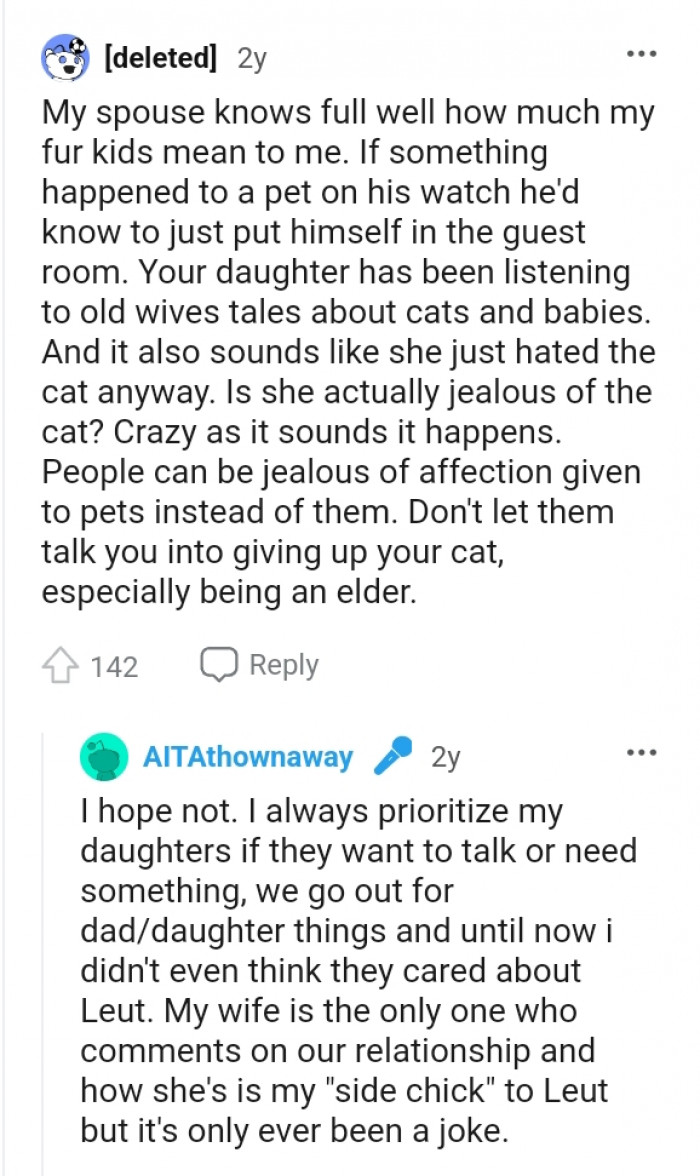
You are surrounded by inconsiderate people

The Impact of Life Changes on Decision-Making
Life transitions, such as the upcoming birth of a child, often provoke significant stress and can lead to impulsive decision-making. Research from the University of California, Berkeley, suggests that individuals facing major life changes may be more susceptible to emotional outbursts and conflicts, as their cognitive resources are spread thin. This phenomenon can lead to rash actions, like the daughter’s decision to send the cat to a shelter, which may have been influenced by her anxiety about the impending change.
To navigate such transitions more effectively, experts recommend employing stress-reduction techniques, such as cognitive-behavioral strategies, which help individuals reframe their thoughts and reactions. By reducing overall stress levels, families can create a more stable climate for making decisions that consider the emotional well-being of all members, including pets.
Encouraging open dialogue about fears and concerns related to parenting can foster trust and understanding between partners.
Therapists often recommend creating regular check-ins to ensure that both parents feel heard and supported during this transition.
This proactive approach can lead to a more harmonious family environment and improved emotional well-being for all members.
Why do people think it's okay to throw away animals?

How dare they do that?

Sending your cat to a shelter was underhanded
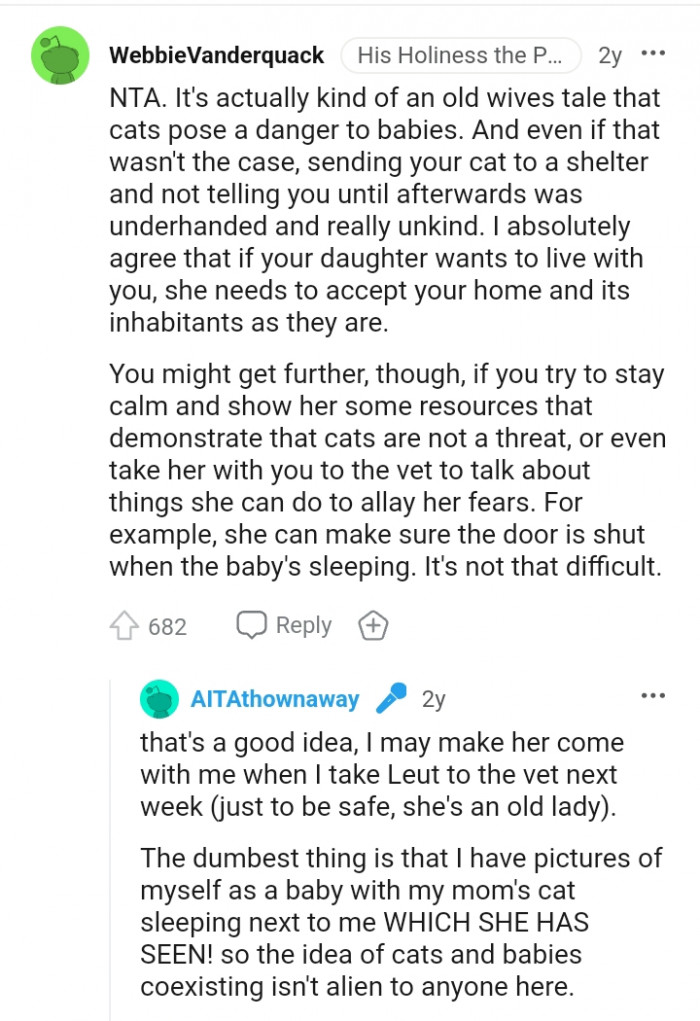
The phenomenon of *displaced aggression* may be relevant in understanding the father’s reaction to his daughter's actions. Research published in the journal Aggressive Behavior explains that individuals may redirect their frustrations about one situation (like the stress of a new baby) onto an unrelated target (the daughter’s decision about the cat). This misdirection can lead to disproportionate responses that don’t truly address the root of the emotional distress.
Recognizing this tendency can help family members avoid escalating conflicts by encouraging them to identify and communicate the actual sources of their stress. Techniques such as journaling or discussing feelings with a neutral party can facilitate clearer communication and reduce the likelihood of misdirected anger.
A lesser person would put on the streets immediately

You throwing her out is an overreaction

This Redditor is wondering what kind of people they are

Finding Common Ground in Family Decisions
To foster healthier family dynamics, it’s crucial to cultivate a willingness to compromise. Psychologists emphasize that compromise is a fundamental aspect of maintaining healthy relationships and can be particularly beneficial when navigating family decisions. Research from Harvard University suggests that families who practice collaborative problem-solving tend to report higher levels of satisfaction and lower instances of resentment.
Encouraging family members to express their perspectives while actively seeking common ground can lead to more agreeable outcomes. For instance, discussing the potential for creating a safe space for the cat away from the baby, rather than imposing an ultimatum, can help preserve relationships. This approach not only respects each member’s feelings but also strengthens the family unit as a whole.
Kids grow up but domestic animals are dependent
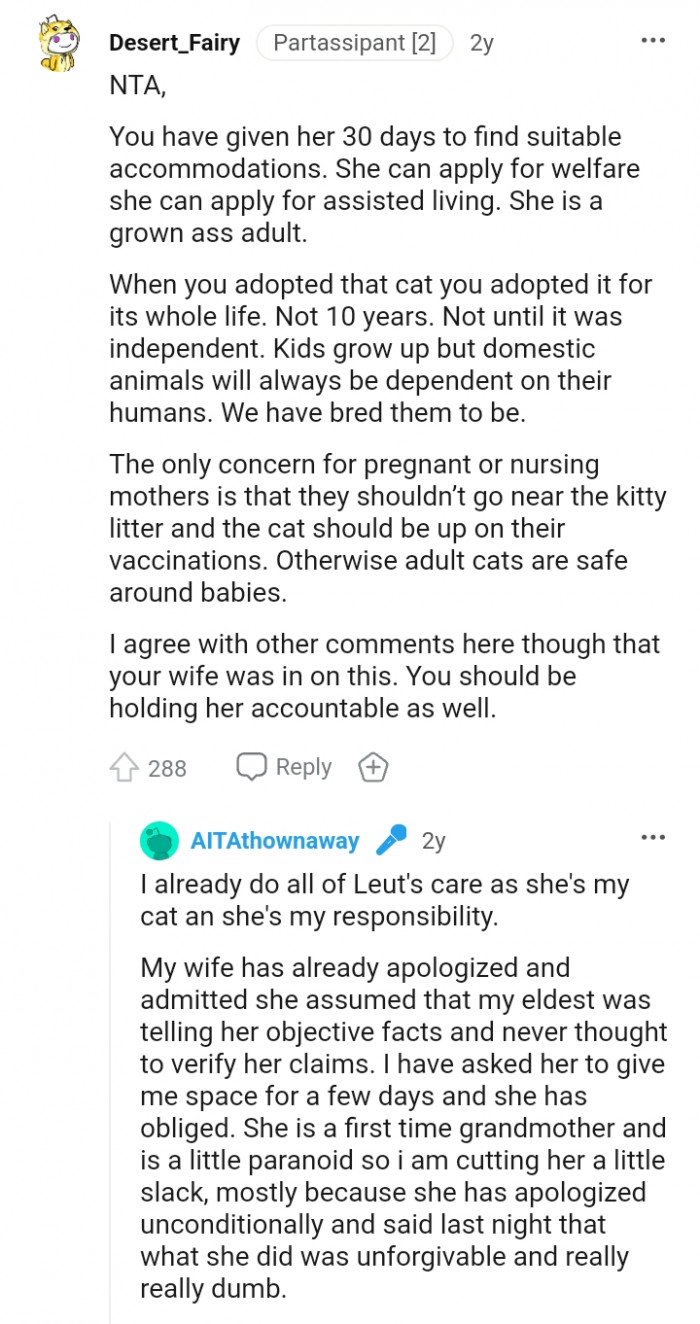
The OP added this edit later on...

The numerous documented instances where cats have traveled hundreds or even thousands of miles through places they have never been to find their owners provide the most striking proof that cats genuinely care about people. Many cat owners claim that their feline companion will offer solace when they are distressed, and the OP’s cat did just that.
So the OP's girlfriend was wrong to send the cat away.
Psychological Analysis
This situation illustrates the challenges expecting parents face as they navigate complex decisions regarding pets and family dynamics.
It's essential for both partners to engage in open discussions that honor their feelings and perspectives, ultimately fostering a supportive environment for the family's growth.
Analysis generated by AI
Analysis & Alternative Approaches
In conclusion, navigating the complexities of expecting parenthood requires clear communication and mutual understanding.
By prioritizing collaborative decision-making and addressing emotional needs, families can foster healthier dynamics and support one another through this transition.
Ultimately, this can lead to a more cohesive family unit and better outcomes for both parents and children.
Ultimately, the intersection of family dynamics, emotional regulation, and effective communication plays a pivotal role in resolving conflicts like the one presented in this case. Research suggests that proactive measures, such as regular family meetings and fostering open dialogue, can significantly improve relational outcomes. As families navigate the complexities of major life transitions, implementing strategies rooted in psychological principles can lead to healthier interactions and deeper emotional connections.
Engaging in practices that promote understanding and empathy, as highlighted by studies in attachment theory and emotional regulation, can transform potentially hurtful situations into opportunities for growth and reconciliation. By prioritizing communication and collaboration, families can navigate their unique challenges more effectively, ultimately ensuring that both human and animal family members thrive in a supportive environment.



